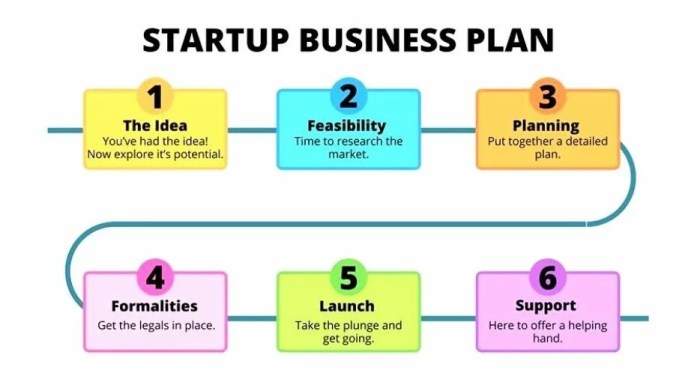Crafting a Successful Startup Business Planning Strategy
Startup business planning is the cornerstone of every new venture, laying the foundation for success and growth. As we delve into the intricacies of creating a comprehensive business plan, we uncover the essential components that drive startups towards prosperity. Join us on this journey of strategic decision-making and forward-thinking as we explore the world of startup business planning.
Exploring the significance of each section within a business plan and how financial forecasting plays a pivotal role in securing funding, we unravel the secrets to a successful startup business strategy.
Importance of Startup Business Planning
Startup business planning is crucial for new ventures as it provides a roadmap for the company's success and growth. It helps entrepreneurs understand their market, competition, and target audience, allowing them to make informed decisions and set realistic goals.
Key Benefits of Having a Well-Thought-Out Business Plan
- Clear Vision: A business plan helps in defining the vision and mission of the company, guiding all operations towards a common goal.
- Risk Management: By conducting thorough market research and financial projections, entrepreneurs can identify potential risks and develop strategies to mitigate them.
- Resource Allocation: Having a business plan assists in efficiently allocating resources such as capital, manpower, and time to achieve optimal outcomes.
- Attracting Stakeholders: A well-crafted business plan can attract investors, lenders, and partners by showcasing the potential of the business and the return on investment.
How Startup Business Planning Can Help in Securing Funding and Investment
Startup business planning plays a vital role in securing funding and investment by providing a clear picture of the business model, market opportunity, and financial projections. Investors are more likely to support a venture with a solid business plan as it demonstrates the entrepreneur's commitment, strategic thinking, and potential for growth.
Additionally, a business plan serves as a communication tool to convey the value proposition of the business to external stakeholders, increasing the chances of securing funding and investment.
Components of a Business Plan
Creating a comprehensive business plan is essential for the success of any startup. A well-thought-out business plan not only serves as a roadmap for your business but also helps in securing funding and attracting potential investors.
Essential Sections of a Startup Business Plan
- Executive Summary: Provides an overview of the business, its goals, and how it plans to achieve them.
- Company Description: Describes the nature of the business, target market, and unique value proposition.
- Market Analysis: Evaluates the industry, target market, and competitors to identify opportunities and threats.
- Organization and Management: Artikels the structure of the company, including key team members and their roles.
- Product or Service Line: Details the offerings of the business and how they meet customer needs.
- Marketing and Sales Strategy: Describes how the business will attract and retain customers.
- Financial Projections: Includes a detailed financial plan, including income statements, cash flow projections, and break-even analysis.
- Funding Requirements: Specifies the amount of funding needed and how it will be used.
- Appendix: Contains additional information, such as resumes of key team members, detailed market research, and legal documents.
Significance of Market Analysis in a Business Plan
Market analysis is a crucial component of a business plan as it helps in understanding the industry landscape, customer needs, and competitive forces. By conducting thorough market research, a startup can identify gaps in the market, assess the demand for its products or services, and develop effective marketing strategies to reach its target audience.
Company’s Organizational Structure in the Plan
Incorporating the organization and management section in a business plan is vital for showcasing the company's structure, leadership team, and key responsibilities. This section helps investors and stakeholders understand the hierarchy within the organization, the expertise of team members, and how decision-making processes are implemented.
A clear organizational structure demonstrates the business's capacity to execute its strategies and achieve its goals effectively.
Financial Planning for Startups

Financial planning is a crucial aspect of startup business planning as it helps in determining the financial viability and sustainability of the business idea. It involves creating realistic financial projections and identifying key financial metrics that investors look for in a business plan.
Importance of Financial Forecasting
Financial forecasting is essential for startups as it helps in estimating future revenue, expenses, and cash flow. By predicting financial outcomes, entrepreneurs can make informed decisions, set realistic goals, and identify potential risks. This allows for better financial management and resource allocation, increasing the chances of business success.
Creating Realistic Financial Projections
To create realistic financial projections for a new business, entrepreneurs should conduct thorough market research, analyze industry trends, and consider various factors that may impact the financial performance of the business. It is important to be conservative yet realistic in revenue projections and accurately estimate expenses to avoid overestimating profits.
Utilizing financial modeling tools and seeking guidance from financial experts can also help in developing accurate financial forecasts.
Key Financial Metrics for Investors
Investors typically look for key financial metrics in a business plan to assess the financial health and potential growth of the startup. Some of the important financial metrics include:
- Revenue projections: Investors want to see realistic revenue forecasts that demonstrate the revenue-generating potential of the business.
- Profit margins: Healthy profit margins indicate efficient operations and sustainable profitability.
- Cash flow management: Investors are interested in how well the startup manages its cash flow to meet financial obligations and fund growth initiatives.
- Return on investment (ROI): Investors evaluate the expected ROI to determine the profitability and attractiveness of investing in the startup.
- Burn rate: The rate at which the startup is spending its capital is crucial for investors to assess the sustainability of the business and the need for additional funding.
By focusing on these key financial metrics and presenting well-researched and realistic financial projections, startups can attract potential investors and secure the necessary funding for growth and expansion.
Marketing Strategy Development

Developing a comprehensive marketing strategy is crucial for the success of any startup. This involves identifying and understanding your target market, creating a plan to reach them effectively, and integrating marketing tactics into your overall business planning process.
Importance of Target Market Analysis
Conducting a target market analysis is essential in a business plan as it helps you identify who your ideal customers are, their needs, preferences, and buying behaviors. This analysis provides valuable insights that can guide your marketing efforts and ensure that you are targeting the right audience.
Integrating Marketing Tactics
- Identify your unique selling proposition (USP) and use it to differentiate your startup from competitors.
- Utilize various marketing channels such as social media, content marketing, , and email marketing to reach your target audience.
- Set clear marketing goals and key performance indicators (KPIs) to measure the effectiveness of your marketing efforts.
- Regularly review and adjust your marketing strategy based on the feedback and data collected to ensure continuous improvement.
Final Conclusion
In conclusion, startup business planning is not just a roadmap but a compass that guides entrepreneurs through the turbulent waters of the business world. By incorporating market analysis, financial planning, and marketing strategy development, startups can position themselves for sustainable growth and long-term success.
Embrace the power of strategic planning and watch your startup thrive in the competitive market landscape.
Question Bank
Why is startup business planning crucial for new ventures?
Startup business planning provides a roadmap for success, helping entrepreneurs define their goals and strategies for growth.
How can financial forecasting benefit startup business planning?
Financial forecasting allows startups to anticipate future financial needs and make informed decisions to achieve their business objectives.
What key benefits does a well-thought-out business plan offer?
A well-thought-out business plan can attract investors, secure funding, and provide a clear direction for the startup's development.
Why is market analysis important in a business plan?
Market analysis helps startups understand their target audience, competitors, and industry trends, enabling them to make informed marketing decisions.
How can marketing tactics be integrated into the overall business planning process?
By aligning marketing tactics with the business goals Artikeld in the plan, startups can create a cohesive strategy that drives customer engagement and brand awareness.




